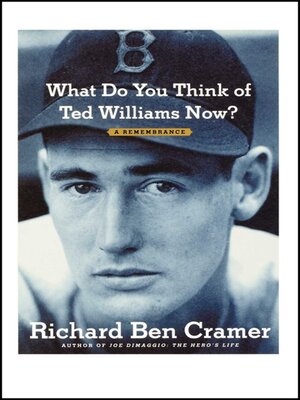
Sign up to save your library
With an OverDrive account, you can save your favorite libraries for at-a-glance information about availability. Find out more about OverDrive accounts.
Find this title in Libby, the library reading app by OverDrive.



Search for a digital library with this title
Title found at these libraries:
| Loading... |
Richard Ben Cramer, Pulitzer Prize winner and acclaimed biographer of Joe DiMaggio decodes baseball icon Ted Williams and finds not just a great player, but also a great man.
When legendary Red Sox hitter Ted Williams died on July 5, 2002, newspapers reviewed the stats, compared him to other legends of the game, and declared him the greatest hitter who ever lived.
In 1986, Richard Ben Cramer spent months on a profile of Ted Williams, and the result was the Esquire article that has been acclaimed ever since as one of the finest pieces of sports reporting ever written.
Given special acknowledgment in The Best American Sportswriting of the Century and adapted for a coffee-table book called Ted Williams: The Seasons of the Kid, the original piece is now available in this special edition, with new material about Williams's later years.
While his decades after Fenway Park were out of the spotlight — the way Ted preferred it — they were arguably his richest, as he loved and inspired his family, his fans, the players, and the game itself. This is a remembrance for the ages.
When legendary Red Sox hitter Ted Williams died on July 5, 2002, newspapers reviewed the stats, compared him to other legends of the game, and declared him the greatest hitter who ever lived.
In 1986, Richard Ben Cramer spent months on a profile of Ted Williams, and the result was the Esquire article that has been acclaimed ever since as one of the finest pieces of sports reporting ever written.
Given special acknowledgment in The Best American Sportswriting of the Century and adapted for a coffee-table book called Ted Williams: The Seasons of the Kid, the original piece is now available in this special edition, with new material about Williams's later years.
While his decades after Fenway Park were out of the spotlight — the way Ted preferred it — they were arguably his richest, as he loved and inspired his family, his fans, the players, and the game itself. This is a remembrance for the ages.






